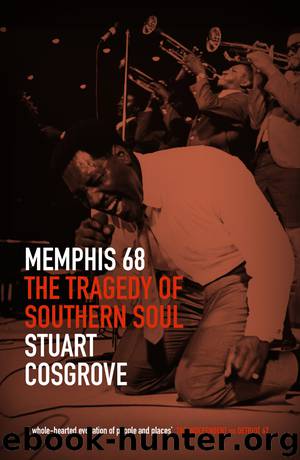Memphis 68 by Cosgrove Stuart;

Author:Cosgrove, Stuart;
Language: eng
Format: epub
Publisher: Birlinn Ltd
Back in Memphis, on the morning after King’s assassination, Frank R. Ahlgren, editor of The Commercial Appeal, announced a $25,000 reward for information leading to the capture of the killer. It came with the veneer of public service but was at best opportunistic, at worst guilt money. The paper had pilloried King in editorials and published scathing cartoons prior to his death. The editor was an unwavering supporter of Mayor Loeb in his opposition to the strike and complied with FBI and police requests to place stories critical of civil rights. But, in fairness to the paper, it published a strident front-page editorial that raged against violence and described the killing as ‘a tragedy for Memphis’.
Meanwhile, the hunt for James Earl Ray intensified. Within days the FBI were focusing a strand of their investigation on a bar called the Grapevine Tavern on Arsenal Street, St Louis, owned by Ray’s brother John Larry Ray. The bar had opened recently, on New Year’s Day 1968, and had quickly become a magnet for criminals, disaffected Ku Klux Klan members and supporters of George Wallace, the segregationist politician and American Independent Party candidate, whose headquarters were on the same block. James Earl Ray had been an ardent supporter of Wallace’s presidential campaign, and the presence of Klan members hanging out at the Grapevine gave the investigation team serious pause for thought. There was a bitter irony in this line of enquiry. Although the FBI had always kept a close eye on Klan activity, much of their recent focus via the COINTELPRO programme and the Memphis-based Operation Lantern Spike focused on black militant groups like the Panthers, the Blackstone Rangers and the Memphis Invaders. The files on Martin Luther King held in Atlanta under his code name ‘Zorro’ far outweighed those on local Klan activity. In a desperate bid to bring balance to their efforts, the FBI targeted Klansmen everywhere, heaping intense pressure on the Mississippi Klan especially, who had a history of bomb-making and were active in blowing up synagogues and killing black activists. A Georgia lawyer, Jesse Stoner, the founder of the National States Right Party (NSRP) and publisher of the fascist newspaper The Thunderbolt, was an early Klan suspect (later he was to become James Earl Ray’s attorney). Stoner, who ran for governor in Georgia in 1970 and once described Hitler as ‘too moderate’, had often called for King’s assassination, but he had an airtight alibi on the night of the murder: he was being shadowed by FBI agents as he addressed an NSRP chapter at a Klansman’s barbershop in Meridian, Mississippi.
It was into this febrile atmosphere that a young singer, Linda Lyndell, arrived in Memphis. She may have been one of the most talented and least fortunate singers who ever set foot in the city. Lyndell’s reputation preceded her. Her real name was Linda Rowland and she was born and raised in Gainesville, Florida, where she became a gifted child singer on the southern gospel circuit, often the only white girl in a black choir.
Download
This site does not store any files on its server. We only index and link to content provided by other sites. Please contact the content providers to delete copyright contents if any and email us, we'll remove relevant links or contents immediately.
Aircraft Design of WWII: A Sketchbook by Lockheed Aircraft Corporation(32181)
The Great Music City by Andrea Baker(31230)
Call Me by Your Name by André Aciman(20340)
The Secret History by Donna Tartt(18792)
The Art of Boudoir Photography: How to Create Stunning Photographs of Women by Christa Meola(18493)
Shoot Sexy by Ryan Armbrust(17630)
Plagued by Fire by Paul Hendrickson(17310)
Portrait Mastery in Black & White: Learn the Signature Style of a Legendary Photographer by Tim Kelly(16927)
Adobe Camera Raw For Digital Photographers Only by Rob Sheppard(16878)
Photographically Speaking: A Deeper Look at Creating Stronger Images (Eva Spring's Library) by David duChemin(16580)
Ready Player One by Cline Ernest(14475)
Pimp by Iceberg Slim(14272)
Bombshells: Glamour Girls of a Lifetime by Sullivan Steve(13942)
The Goal (Off-Campus #4) by Elle Kennedy(13415)
Art Nude Photography Explained: How to Photograph and Understand Great Art Nude Images by Simon Walden(12932)
Kathy Andrews Collection by Kathy Andrews(11703)
The Priory of the Orange Tree by Samantha Shannon(8823)
The remains of the day by Kazuo Ishiguro(8778)
Thirteen Reasons Why by Jay Asher(8761)
